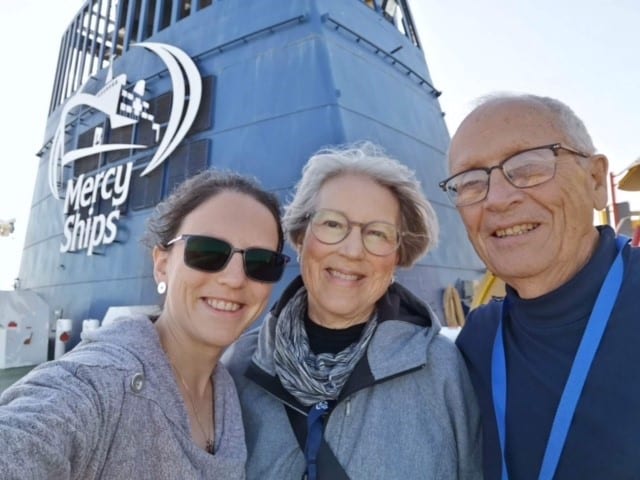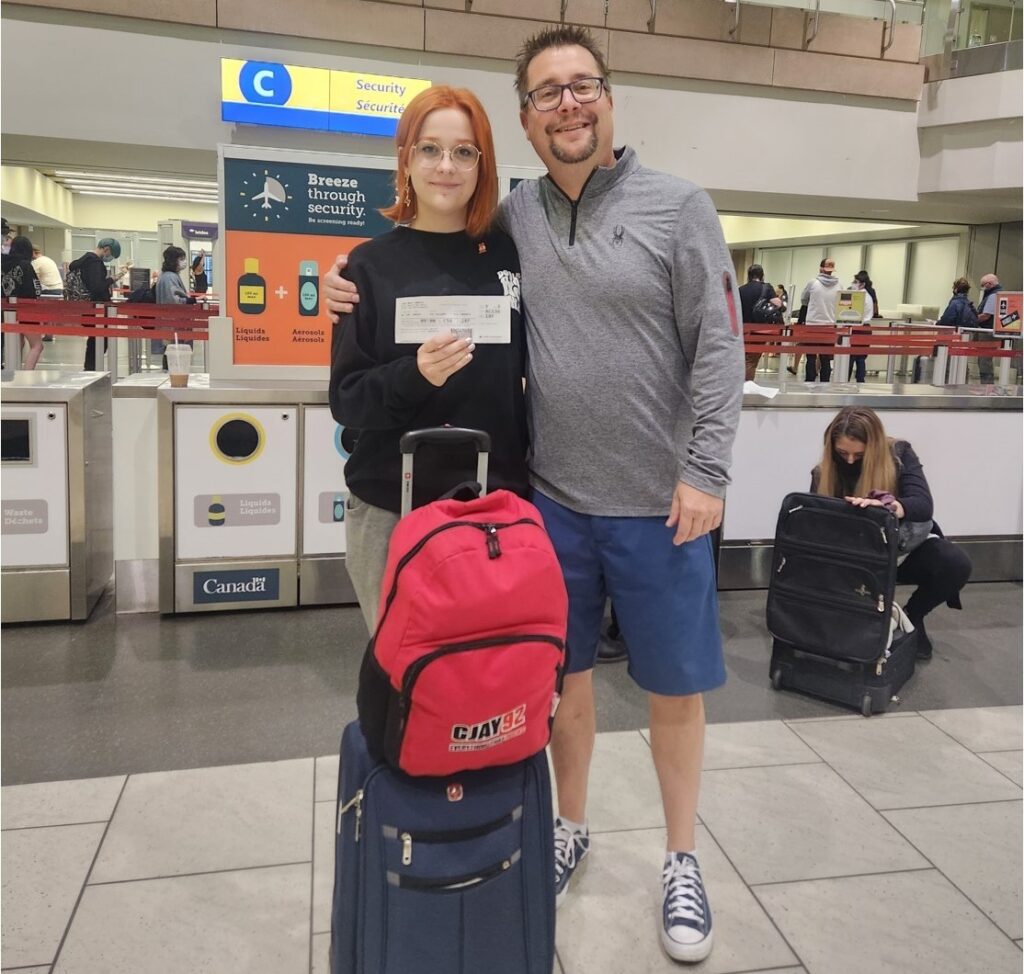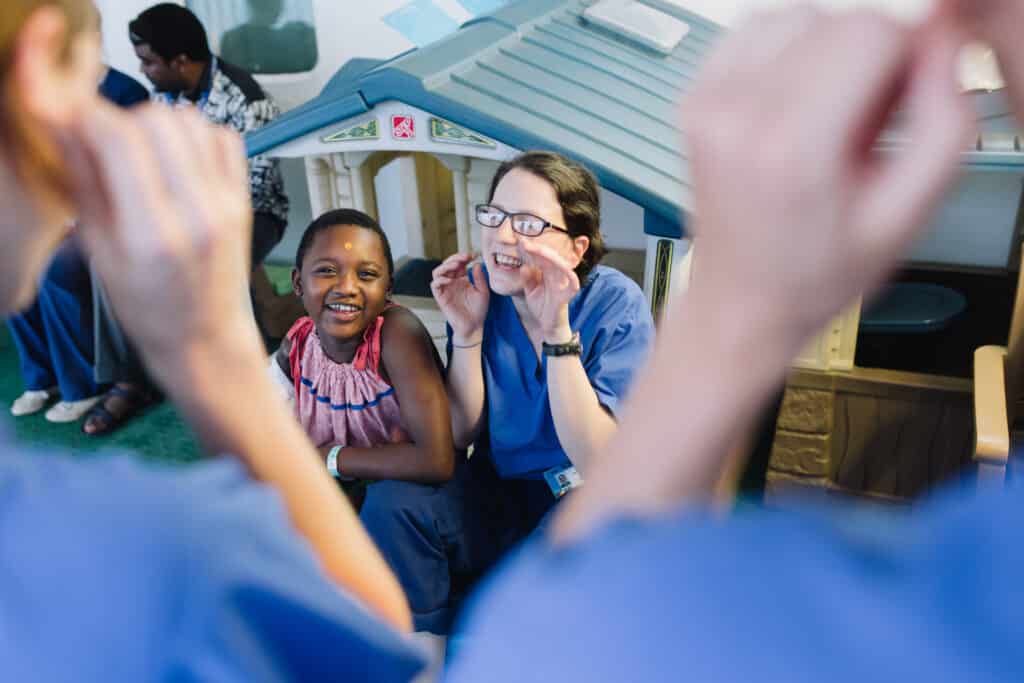The Ripple Effect of Volunteerism
Behind-the-scenes when a family member volunteers with Mercy Ships.
When one person chooses to serve with Mercy Ships, an entire community is affected by that decision. When Canadians come on board our hospital ships for terms of weeks, months or even years, one of the key factors in their on-board success is a supportive network. Family, friends, church members, or co-workers support and encouragement help volunteers carry out their commitment in a challenging environment that is characteristic of providing free health care in a low resource setting in West Africa.
The members of the volunteer’s network become an integral part of the mission of the organization to bring hope and healing because they enable people to persevere in their journey of service and share the inspiring stories of their humanitarian journey.
In response to a series of questions posed, we go behind-the-scenes with three Canada volunteer families who share their stories of coming alongside a Mercy Ships volunteer. By way of introduction, they are:

Greg (right) and Wendy Gilbert (middle) of Ontario, parents of Danita (left), a volunteer nurse by training who became a Hospital Quality Manager.

Trevor Law (right) of Alberta, father of Macy (left), a Dining Room staff member.

Olivia Chow (right) of British Columbia, sister of Riley (left), a Writer in the ship's Communications Department.
Why do you support volunteer involvement with Mercy Ships?
The GILBERTS: When we saw our daughter Danita leave in 2015, we had a feeling she would find her place. We’re looking forward to seeing her live her passion. We weren’t surprised that she wanted to use her profession to serve people in great need, she has always been sensitive to the underdogs, people who are disadvantaged or marginalized. It is part of who she is.
TREVOR: At first glance, I had confidence in Mercy Ships because several family members have served there. It is a safe environment for a first-time humanitarian aid experience which I appreciate as a parent. I also wanted to encourage my daughter Macy to have a meaningful experience to see the world. We live in the suburbs and it’s a chance to get out and better understand the world we live in.
OLIVIA: Even though it’s been a long time coming, our family discovered Mercy Ships almost 20 years ago and it seemed like a natural fit that one day someone would get involved. Even our family doctor used to serve there. I find that my brother Riley stands out for his adventurous spirit, and he dares to take the plunge when he is convinced, I could only support him in his choice!
With the distance between you, how do you maintain the bond?
The GILBERTS: When Danita has time, we video call each other and share news about our large family. Danita has 14 nieces and nephews and several siblings with whom she likes to keep in touch and she is really good at it. I (mom) sent her letters because it is nice for her to receive mail and for me to take the time to write. We send our daughter little packages. We also share her news with our church since it is important for Danita to know that her church is behind her and praying for her.
TREVOR: We have a video call every Sunday as a family, and also a call once a week. I take the time to talk with Macy to encourage her in her learning as there is a lot to incorporate into this first experience.
OLIVIA: We have an online family chat group and I feel like I hear from Riley almost every day. Despite the distance, there is a sense of closeness. My brother is good at telling stories – that’s what he does for a living – and sharing the details of his life on board.
What do you see as beneficial for them in this process?
The GILBERTS: We see that Danita is living her vocation to the fullest and we rejoice with her. Her work on board allows her to experience a caring community, without a marked professional hierarchy and very enriching humanly and spiritually. We can only be happy for her.
TREVOR: This is Macy’s first experience alone overseas. I see her learning about herself, daring to step out of her comfort zone and making connections with people from all over the world. These friendships can last a lifetime.
OLIVIA: One of Riley’s reasons for going to serve with Mercy Ships was to fulfill his need to immerse himself in the multicultural experience of life on board. He seems inspired by the vibrant community that works together for the mission of Mercy Ships.
What has been difficult for you as a support person?
The GILBERTS: When Danita travels to the ship and we don’t hear from her for two days, it’s hard as parents. Still, we trust and pray for her. With time and all the friendships, she has developed, she travels more often with other fellow volunteers, and we are happy for her.
TREVOR: I know I have to let her experience her own challenges and trust her. This is her learning the world of work through volunteering. Macy served at first on the Global Mercy when it was not yet on a mission with patients. Initially, she was disappointed that she couldn’t interact with patients, but I encouraged Macy by telling her that sometimes you don’t serve the way you want to, but you serve the way it’s needed. Whether there are patients on board or not, all volunteers are involved in helping to achieve the larger mission of Mercy Ships.
OLIVIA: Even though Riley shares what he is experiencing on board with our family well, we have not seen each other for almost a full year and long-distance communication cannot completely replace a face-to-face discussion.
You had the chance to visit your family member on board; what was your reaction to seeing the Mercy Ships mission in action?
The GILBERTS: It gave us a whole new perspective! We’ve been hearing about Mercy Ships since 2015, but coming on board, seeing Danita, the scale of the facilities, and meeting a community of volunteers who truly appreciate each other was an unforgettable experience. We were welcomed with open arms. The culture and values on board advocate treating people regardless of skin color, language, creed, nationality, or religion. And that is so inspiring. We take this experience as a reminder of the importance of caring for those, marginalized or not, around us in Canada. If we could provide that level of care to our own communities, it would be wonderful.
OLIVIA: After hearing all the stories from my brother, seeing the reality of the place and the people was a real treat. Visiting the ship gave me a deeper understanding of the mission. Beyond the surgical aspect, it was the medical training of the local health professionals that caught my attention. On board, I found it easy to embrace the mission. No matter what beliefs you come with, you can feel like contributing. At one of Riley’s team meetings, I witnessed a moment of prayer and found that the way they prayed for each other brought mutual caring. When we take the time to say out loud what we wish for each other that is beautiful and good, it is highly beneficial, it is a simple principle that could be more widespread.
Conclusions
Volunteering and supporting a cause like Mercy Ships often has a snowball effect. The community of a loved one who is involved in humanitarian volunteering become aware. They are invited to a front row seat to experience the reality of the field, with all the challenges and joys that come with it.
Behind the scenes of volunteering, there is always a network of people who support and accompany the volunteers from their first day on board the hospital ship to the day they return home. The joy of hearing the stories up close gives the opportunity to be inspired. This inspiration comes from the story of a patient whose life has been transformed, the dedication of the volunteers and the richness of supporting those who are dedicated to this cause. This cause, which goes far beyond physical healing, allows families and communities to regain their dignity, and to live life to the fullest, free of being defined by a medical condition.

